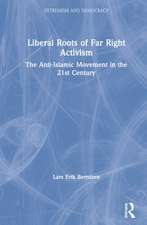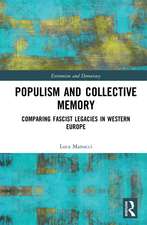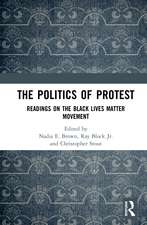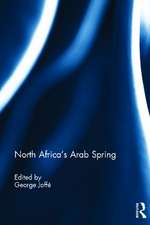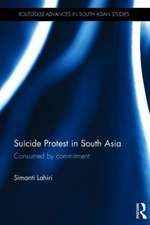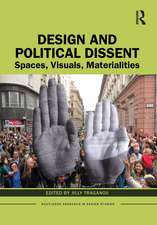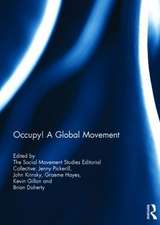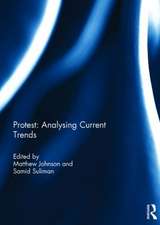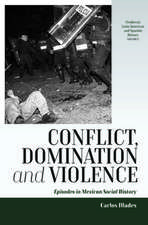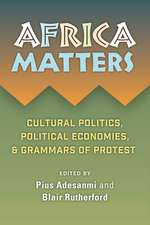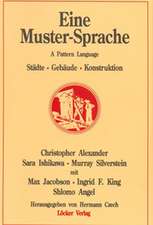Tunisia: From stability to revolution in the Maghreb: The Contemporary Middle East
Autor Christopher Alexanderen Limba Engleză Paperback – 27 mai 2016
Providing the most up-to-date introduction to Tunisia’s post-independence and post-Arab Spring politics, concisely written chapters cover topics such as:
- state formation
- domestic politics
- economic development
- foreign relations
- colonialism
- the Arab Spring; its factors and repercussions
An essential inclusion on courses on Middle Eastern politics, African politics, and political science in general, this accessible introduction to Tunisia will also be of interest to anyone wishing to learn more about this significant region.
| Toate formatele și edițiile | Preț | Express |
|---|---|---|
| Paperback (1) | 409.51 lei 6-8 săpt. | |
| Taylor & Francis – 27 mai 2016 | 409.51 lei 6-8 săpt. | |
| Hardback (1) | 763.39 lei 6-8 săpt. | |
| Taylor & Francis – 31 mai 2016 | 763.39 lei 6-8 săpt. |
Din seria The Contemporary Middle East
-
 Preț: 287.71 lei
Preț: 287.71 lei -
 Preț: 290.15 lei
Preț: 290.15 lei -
 Preț: 280.04 lei
Preț: 280.04 lei -
 Preț: 301.55 lei
Preț: 301.55 lei -
 Preț: 200.13 lei
Preț: 200.13 lei -
 Preț: 203.67 lei
Preț: 203.67 lei -
 Preț: 213.16 lei
Preț: 213.16 lei -
 Preț: 482.53 lei
Preț: 482.53 lei - 15%
 Preț: 439.20 lei
Preț: 439.20 lei - 13%
 Preț: 297.99 lei
Preț: 297.99 lei -
 Preț: 431.35 lei
Preț: 431.35 lei -
 Preț: 408.88 lei
Preț: 408.88 lei -
 Preț: 463.28 lei
Preț: 463.28 lei -
 Preț: 485.40 lei
Preț: 485.40 lei - 15%
 Preț: 460.25 lei
Preț: 460.25 lei -
 Preț: 442.71 lei
Preț: 442.71 lei -
 Preț: 358.19 lei
Preț: 358.19 lei -
 Preț: 349.91 lei
Preț: 349.91 lei -
 Preț: 488.71 lei
Preț: 488.71 lei -
 Preț: 290.54 lei
Preț: 290.54 lei -
 Preț: 201.59 lei
Preț: 201.59 lei -
 Preț: 274.88 lei
Preț: 274.88 lei -
 Preț: 200.13 lei
Preț: 200.13 lei
Preț: 409.51 lei
Nou
Puncte Express: 614
Preț estimativ în valută:
78.37€ • 85.10$ • 65.83£
78.37€ • 85.10$ • 65.83£
Carte tipărită la comandă
Livrare economică 22 aprilie-06 mai
Preluare comenzi: 021 569.72.76
Specificații
ISBN-13: 9781138886162
ISBN-10: 1138886165
Pagini: 188
Ilustrații: 2
Dimensiuni: 156 x 234 x 34 mm
Greutate: 0.3 kg
Ediția:Revised
Editura: Taylor & Francis
Colecția Routledge
Seria The Contemporary Middle East
Locul publicării:Oxford, United Kingdom
ISBN-10: 1138886165
Pagini: 188
Ilustrații: 2
Dimensiuni: 156 x 234 x 34 mm
Greutate: 0.3 kg
Ediția:Revised
Editura: Taylor & Francis
Colecția Routledge
Seria The Contemporary Middle East
Locul publicării:Oxford, United Kingdom
Public țintă
General, Postgraduate, and UndergraduateCuprins
Introduction
Chapter 1 – State-building and independence in Tunisia
Chapter 2 – Authoritarianism and stability in Tunisian politics
Chapter 3 – Ben Ai’s collapse and the origins of the Jasmine Revolution
Chapter 4 – The road to the Second Republic
Chapter 5 – Stability, reform and development in Tunisia’s economy
Chapter 6 – Tunisia and the world
Conclusion
Chapter 1 – State-building and independence in Tunisia
Chapter 2 – Authoritarianism and stability in Tunisian politics
Chapter 3 – Ben Ai’s collapse and the origins of the Jasmine Revolution
Chapter 4 – The road to the Second Republic
Chapter 5 – Stability, reform and development in Tunisia’s economy
Chapter 6 – Tunisia and the world
Conclusion
Descriere
The first edition of Tunisia was released just nine months before the eruption of the Arab Spring. The most substantial period of political unrest felt by the Arab world in a half century originated in Tunisia, a fact that confounded expectations about Tunisian politics. This new edition builds upon the first edition’s overview of Tunisia’s political and economic development to examine how one of the region’s hardiest authoritarian orders was toppled by a loosely organised protest wave.
Providing the most up-to-date introduction to Tunisia’s post-independence and post-Arab Spring politics, concisely written chapters cover topics such as:
Providing the most up-to-date introduction to Tunisia’s post-independence and post-Arab Spring politics, concisely written chapters cover topics such as:
- state formation
- domestic politics
- economic development
- foreign relations
- colonialism
- the Arab Spring; its factors and repercussions






